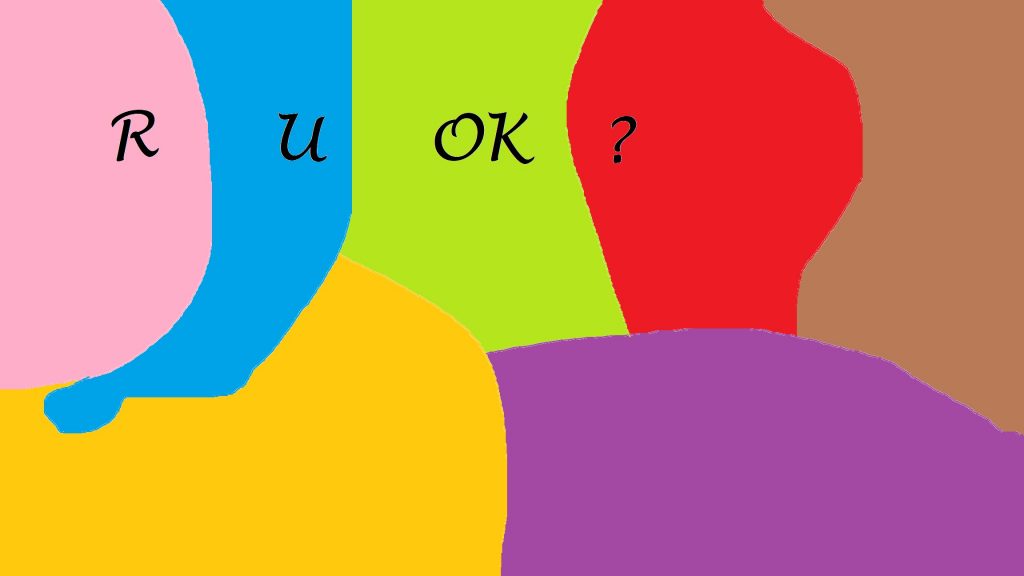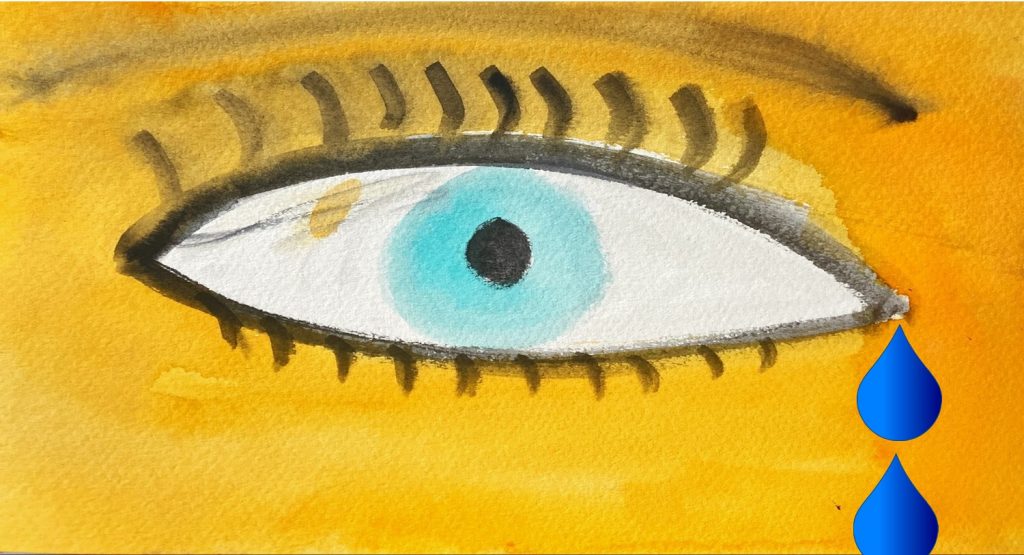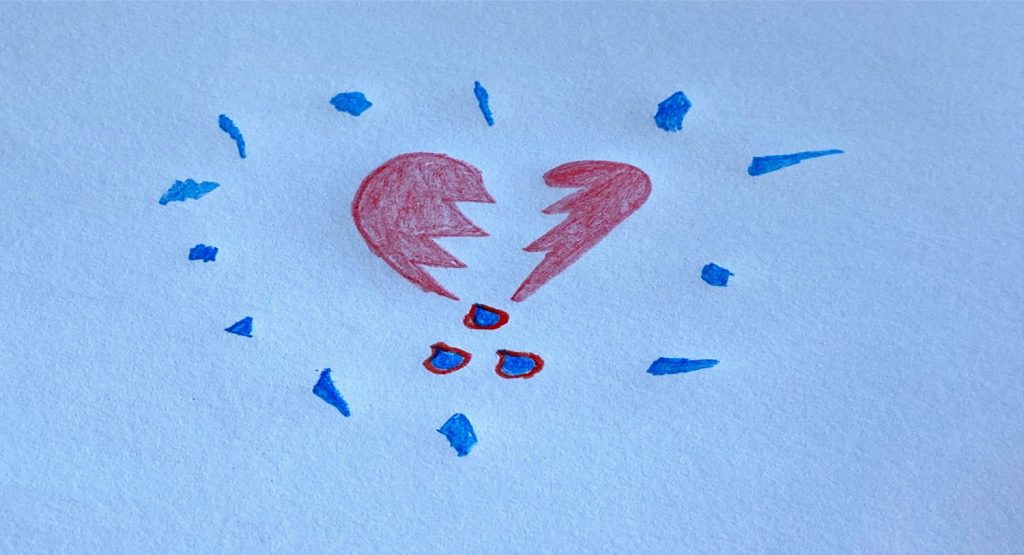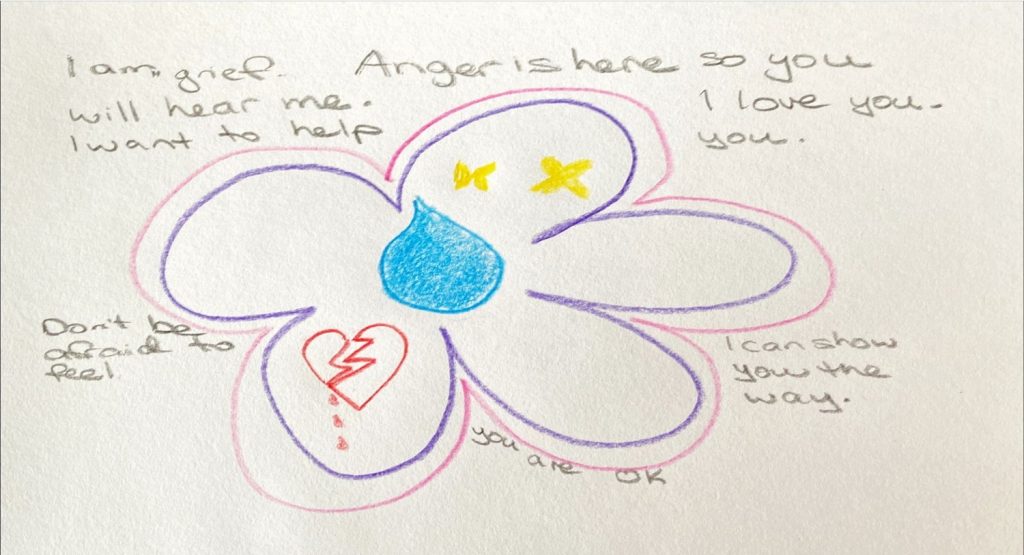
Today is RUOK day.
RUOK day is not only about reminding you that you have the power to help others, but also a reminder to seek help is you are not OK.
Helping others is not just the preserve of those of us who specialise in mental health. We all can help others.
Today I am going to talk about how to ask others if they are OK.
Then I am going to talk about how you can get help if you are not OK.
Most people will not ask for help. Such help seeking is pretty taboo in our society. Have you ever been taught even the basics of a foreign language? If you have you will no doubt have started with how to greet another person. Hello. I am xxx. How are you? And you will not doubt have been taught the response: I am well thankyou.
This is the hidden message of our culture. Don’t tell others how you are feeling!
I am sure you have met people who will avoid any discussions that are hard. These are the people who will avoid responding to your tentative words reaching out for help. Or who will respond with comments designed to stop the conversation.
If you are in that position, don’t give up. Later in this blog I will talk about what you can do to be heard.
WHAT SHOULD I BE LOOKING FOR IN THOSE AROUND ME TO INDICATE I NEED TO ASK RUOK?
Because of the taboos in our society on reaching out to others, it is unlikely a person who needs help will tell you – unless you ask.
The following are times in a person’s life when they might need a little bit of extra help:
• When a relationship has ended or there are difficulties in that relationship.
• When the person is going through stressful times, or there has been an increase in the stress in their life.
• When there are financial difficulties.
• When there are major changes in the person’s life either at home or work.
• When someone/thing they care about has been lost.
• When there is a major health issue.
• Any time you notice someone is struggling.
SIGNS A PERSON IS STRUGGLING
• Things they are saying, especially if they are different:
o They may not be making any sense when they talk, as though they are confused.
o They may tell you they can’t cope or feel things are out of control.
o They may criticise others or themselves.
o You may get the impression they are feeling trapped or in emotional pain.
o They may tell you they feel lonely or are a burden to others.• Things they are doing that may be different:
o They may seem to lack energy or be unmotivated
o They may be unable to switch off
o There may be changes in how much and when they sleep, exercise or eat.
o They may appear uninterested in their appearance. This may extend to their home.
o They may no longer be interested in the things they used to enjoy doing.WHAT DO I DO IF I THINK SOMEONE IS STRUGGLING
If you think someone is struggling then this is the time to consider asking them if they are okay.
Before you do this it is a good idea to consider how or if you might have that conversation with this person.
If you ask the wrong way, and are not prepared for a helpful conversation, you may not help the person. If you feel you are not able to ask, maybe finding another person to ask may be helpful. This is not saying you are not going to be any good at it, but maybe the situation the other person is in , or the relationship you have with them may impact any conversation you may have.
The other person needs to feel they can trust you, or they will not open up to you. So it is wise to consider whether you have been trustworthy in your relationship with that person.
If you feel the other person can’t trust you, you may still be able to reach out to them. In this situation it is best to acknowledge the past. Maybe you could try saying something like:
“I know I haven’t been very trustworthy in the past, but I am concerned about you and I care that you may not be feeling okay.”
If your previous conversations with this person have not involved you listening very well, you can maybe try saying:
“I know I haven’t listened to you very well I the past, but I am concerned that you may not be okay and I want to listen and hear you and support you.”
HOW TO PREPARE TO ASK RUOK
First step is to be ready:
• Ask yourself if you are in the right headspace to listen.
• Ask yourself if you are willing to really listen to the other person.
• Make sure you have the time to have this conversation. It is no good asking someone if they are okay and then rushing off because you have to be somewhere else.
Second step is to be prepared:
• Acknowledge that you are not there to “fix” the other person. You are there to listen. It is okay if you don’t have any answers to their difficulties.
• Don’t rush the other person or fire off questions at them. Be prepared to sit quietly and non judgementally with the other person and allow them the space to process their thoughts and express what they want. When you are trying to survive you spend a lot of time pushing down emotions so you can get through the day. It may take time for the other person to feel able to speak about something that they are feeling very emotional about. It is helpful to bear in mind that it is often embarrassing to discuss problems.
Last step is to choose your moment carefully:
• Find somewhere private and comfortable. A busy place with little privacy is not going to be very conducive to expressing vulnerable thoughts.
• Is this a good time for them to talk? If they are busy and stressed, they are not likely to be willing to take the time out to express how they are feeling.
• You may need to choose another time if they are too busy to talk.
• Consider the way you talk. It is often less threatening when you are sitting side by side doing nothing that requires concentration, or when walking. Being side by side is less confronting than being face to face.
The last point on being side by side highlights the value of being with the other person and doing something together. This is a great time for a conversation where the other person is likely to feel comfortable and able to talk.
IMPORTANT TO CONSIDER
You may be ready to reach out to the other person. But they may not be ready to talk.
Don’t give up. The fact you reached out and expressed your concern will not be lost on the other person. It may be that when they are ready to talk they wil reach out to you.
It is better to have asked than not to have asked. If you ask and they say no, at least you asked. If you don’t ask you will never know if you gave up a wonderful opportunity to reach out to someone in need.
NOW TO ASK – R U OK?
Have a casual conservation.
Start by saying something about what has prompted you to ask.
Examples include:
• You have been quiet lately, how are things going for you?
• I haven’t seen you much lately, is everything going okay for you?
• You’ve seemed really stressed lately, do you want to chat about something?
Now listen and don’t jump in with your own stories.
THEY DON’T WANT TO TALK TO ME – WHAT DO I DO?
Just because you reach out to another person does not guarantee they will talk to you.
It may be the wrong time for them to talk. You could try asking them if it would be okay to check in with them again.
They may feel no one cares and may need to process you request before they are willing to accept you invitation to chat.
Maybe they would feel more comfortable talking to someone else.
You reaching out may lead to them reflecting on their need to talk and they may be willing to talk to or someone else at another time.
THEY DO WANT TO TALK TO ME – WHAT DO I DO?
They welcome your question and tell you about their problem.
So what do you do?
• Remember we talked about you being there to listen, not solve problems.
• Listen.
• Don’t rush to judgement. Have an open mind.
• Give them space to talk. If they pause, don’t rush to fill the silence. Silence is great. Allow the silences and trust the person will talk when ready.
• Ask questions that are open ended, that is that don’t require yes or no answers.
• Ask them to explain the things they say. Don’t assume you understand what they are saying or the impact it has on them. Do this by asking questions that allow space for them to answer in many words. No questions that just require a yes/no. They shut down the conversation.
• Every so often repeat back what you have heard them say and ask if you understood it properly. This give them a chance to correct any misunderstandings and sends the message that you are listening.
I HAVE LISTENED AND THEY HAVE TOLD ME ABOUT THEIR PROBLEM – NOW WHAT DO I DO?
It is at this point you can encourage them to explore what they might be able to do to help themselves.
This may involve someone they can seek help from. It may instead involve spending time together brainstorming ideas on what they may be able to do to change their situation.
Maybe they might see their doctor, talk to a family member, talk to a close friend they trust, see a counsellor.
They may have encountered difficulties in the past and been able to solve them. What did they do back then? Is this something that may work now?
You can also ask them if there is anything they need from you.
CONVERSATION OVER – NOW WHAT?
Once the conversation is over there is still one thing you need to do.
That is to check in with the person at another time.
Let them know you haven’t forgotten them and are still willing to support them.
This allows you to communicate to them that someone cares.
It allows them to feel less isolated.
It may be the encouragement they need to do something about their situation.
It can support them until they are ready to reach out for professional help.
I THINK THEY ARE AT RISK OF SUICIDE – WHAT DO I DO?
If you are concerned the other person is suicidal don’t be afraid to ask.
It can be as simple as “are you thinking about killing yourself?”
Asking will not plant the idea in the other person’s mind. If they are suicidal they already have that idea. If they are not suicidal your asking will not suddenly make them suicidal.
If they answer YES this is what is important for you to do.
- Do not leave them alone. Keeping them safe is important.
- Get professional help.
While you stay with them:
Keep listening to them.
Find out if there is someone they trust who can help them.
Not all people who are suicidal will actually kill themselves. You can ask if they have a plan and the equipment needed to carry it out.
Unless you feel they are in immediate danger (in which case you will dial 000) try the following:
• Call a crisis support line together.
LIFELINE: 13 11 14
SUICIDE CALL BACK SERVICE 1300 659 467
who provide immediate support and advice
• Visit an emergency department together.
• Take them to a place they feel safe where they will not be alone.
HOW DO I GET HELP IF I AM NOT OK?
Reach out to someone you feel comfortable talking to.
If someone reaches out to you, be willing to accept that offer of help.
If you urgently need to talk to someone, or you are feeling suicidal, LIFELINE 13 11 14 is a good starting point.
You can also ring the SUICIDE CALL BACK SERVICE 1300 659 467
For longer term help counselling can be very helpful.
If you would like to talk to me about how I can help you when you are not okay, please contact me on 0409396608 or nan@plentifullifecounselling.com.au
If you would like to learn more, I write a regular newsletter with interesting information, tips, information on courses, and the occasional freebie. At the moment I have a free mindfulness meditation for anyone who signs up to my newsletter. This meditation offers a way to safely explore your feelings and learn to be okay with them. If you would like to subscribe please click on the link here: http://eepurl.com/g8Jpiz
RUOK.ORG.AU IS A GREAT SOURCE OF ADVICE ON HOW TO ASK RUOK










